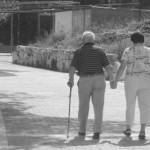As Baby Boomers, many of us are all too aware of the limitations that age and waning physical ability can present to those of advancing years. Being in our 50s and 60s, my wife and I have seen retired friends and older family members struggle with the realities of diminished motor skills and coordination, not to mention cognitive function. Those common skills once taken for granted in youth and middle age can slowly become degraded over time once we get up there in years. And as important as performing actual activities may be, the falling off of physical ability comes, many times, with a loss of independence and, sometimes, even a person’s feeling of self-worth.
For most Americans, both old and young, a great deal of value is placed on the freedom of movement provided by that indispensable and ever-present appliance: the automobile. Over the past century, personal transportation has become a ubiquitous part of our lives, yet we often forget how tenuous our use of these time-saving machines truly can be. Apart from those who live in metropolitan areas blessed with an extensive and well-maintained public transportation infrastructure, it’s a fair bet that a driver’s license and good working car are indispensable components of a free and unfettered lifestyle.

Driving oneself into old age has been an elusive luxury to many in past generations. This may change drastically for Boomers and future generations of senior citizens.
For those without the means to own, or the ability or training to drive a motor vehicle, getting from point A to Point B — or anywhere in between — can certainly be a major challenge; and while some elderly drivers can still be found on the road well into their 80s, many others can find themselves unable or legally prevented from operating their own automobile. In fact, many Baby Boomers may already have found that their own parents or other family members are no longer able to drive themselves. In such cases, except for those who can walk or ride public transportation, one of the only solutions is to hitch a ride with relatives or younger friends.
No doubt, seeing one’s parents being slowly nudged out of the driver’s seat has made many Boomers think about their own future from the standpoint of personal mobility. The idea of being forced into the role of passenger can make even the most independent senior citizen reconsider his or her ability to navigate life in the not-so-distant future. Forget, for a moment, about the actual imposition on the time and energy of others; but just knowing that one must rely on another’s help for visits to the doctor’s office, shopping trips and other necessary outings can weigh heavily on some people’s minds.
Continue reading →
 Addiction, as many Baby Boomers and seasoned citizens have learned, comes in all shapes and sizes. While alcohol and drug dependencies are usually at the top of the list of debilitating and potentially life-threatening problems, other habits and obsessions can take their toll on the unsuspecting.
Addiction, as many Baby Boomers and seasoned citizens have learned, comes in all shapes and sizes. While alcohol and drug dependencies are usually at the top of the list of debilitating and potentially life-threatening problems, other habits and obsessions can take their toll on the unsuspecting.




